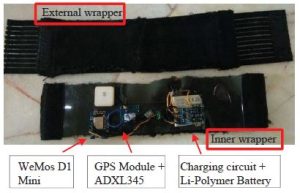Malaysia’s food culture may bond people together over a variety of meals. However, it is this same food culture that has led to 13.3% of Malaysians becoming obese – the highest among Southeast Asian countries. Half of the Malaysian adult population is either overweight or obese, with the Health Ministry warning that the matter is waving a red flag.

An arm belt was designed and developed to encapsulate the system whilst being wrapped around the arm. The material is made out of an elastic yet soft fabric to provide comfort. The electronic system is wrapped in the inner layer, holding the micro-controller, GPS module and charging circuitry with a Li-Polymer battery.
Out of 50.1% of Malaysian adults, 30.4% were overweight and 19.7% obese, as tabulated by the National Health and Morbidity Survey (NHMS) 2019[1].
“Obesity rates are also rising each year, from 14% in 2006 to 15.1% in 2011 and 17.7% recorded in 2015 according to the NHMS studies conducted then. The next study will be conducted in 2024. The problem of obesity and being overweight in Malaysia is now at an alarming level. The definition of being overweight is having a Body Mass Index (BMI) of between 25.0 kg/m2 and 29.9 kg/m2, while for obesity, the BMI is from 30.0 kg/m2 and above,” shared Dr. Sam Toong Hai in a research project he recently conducted titled ‘Internet of Things (IoT) based Obesity and Overweight Monitoring Arm Belt for Teenagers in Malaysia’.
The prevalence of obesity among Malaysia’s youth is mostly due to lifestyle and unhealthy eating habits. The diet of youths are tainted by fast food, sugary treats, and supersized portions.
The Associate Professor from INTI International University’s Faculty of Business and Communications elaborated, “A survey conducted by the Institute of Public Health and the Ministry of Health Malaysia found that the average daily intake of sugar among Malaysian youths increased from seven teaspoons in 2012 to ten teaspoons in 2017, which is more than the recommended limit for adults[2].
“Malaysians generally consume an average of three kilograms of sugar per year in the form of sugary drinks. Survey results show that 36% of Malaysia’s youth drink carbonated drinks at least once a day[3].”
The research further revealed that the advancement in modern technology has contributed to reducing the dilemma of obesity by providing new, widely used, lightweight, easy to use, and low-cost consumer-based fitness wearable trackers and food intake systems. These helpful tools provide an objective indicator of a user’s daily energy expenditure (EE), and food history over long periods.
“Users will be able to track their data over time through a mobile application or website. However, data collected by these systems should be relevant, understandable, and pervasive for the purpose of providing an accurate measurement and better health outcome.

The device will be wrapped around the arm of the user using a Velcro belt to enable the tracking function via smart phone.
“This project that I carried out with my fellow counterparts was aimed at developing a portable IoT gadget to monitor teenagers’ daily physical activities whilst addressing the root cause of this issue. The device, which is battery-powered, has a microcontroller system equipped with a global-positioning system (GPS) and a movement sensor (accelerometer). It will be wrapped around the arm of the user using a Velcro belt to enable the tracking function via smart phone. The data is synced and recorded on an online platform which could also be monitored remotely by another user,” explained Dr. Sam.
According to Dr. Sam, the device would be an ideal option for parents who want to monitor the progress of their child’s weight so as to provide immediate support when slight changes in the BMI or daily activities are detected.
“Many healthcare professionals predict that obesity will continue rising in the coming decade all over the world due to lifestyle and obesity-related factors such as sedentary jobs, technological innovations, and unhealthy food. The advancement in smartphone devices, and wireless sensor networks will further revolutionize the local and global healthcare domain by providing intelligent, low cost mobile health and wireless body area network (WBAN) systems that will facilitate communication with patients to acquire better services within an optimal period time,” Dr. Sam concluded.
[1] https://codeblue.galencentre.org/2021/11/30/more-malaysians-overweight-obese-in-2020/#:~:text=By%20CodeBlue%20%7C%2030%20November%202021,according%20to%20an%20MOH%20study.
[2] https://www.thestar.com.my/lifestyle/health/2021/03/05/we-need-to-decrease-our-sugar-intake
[3] https://www.nst.com.my/lifestyle/heal/2019/07/502533/childhood-obesity-growing-health-crisis-malaysia